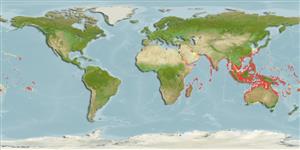Common names from other countries
Issue
Genetic data indicate the presence of cryptic species with partial parapatric distribution. The species Paniliza macrolepis may be limited to West Indian Ocean lineages (Durand & Borsa (2015: Ref. 114224).
Environment: milieu / climate zone / depth range / distribution range
экология
морской; пресноводный; солоноватоводный демерсальный; катадромный (Ref. 46888); пределы глубины 10 - ? m (Ref. 40448). Tropical; 32°N - 35°S, 22°E - 136°W
Indo-Pacific: east coast of Africa, south to Eastern Cape in South Africa (Ref. 52193), including Madagascar, Seychelles, Rodriguez; north to Sri Lanka and India (except Bay of Bengal), Andaman and Nicobar Islands, east to Indonesia, China, the Philippines, Japan, Marshall and Tuamoto islands, Melanesia and Polynesia (Ref. 2830). Distribution includes the Red Sea (Ref. 84159) and Persian Gulf (Ref. 66734).
Length at first maturity / Size / Вес / Возраст
Maturity: Lm 23.0 range ? - ? cm
Max length : 60.0 cm SL самец/пол неопределен; (Ref. 4967); common length : 26.0 cm SL самец/пол неопределен; (Ref. 4967); наибольший возраст (опубликованны данные): 6 годы (Ref. 127264)
колючие лучи спинного плавника (общее число) : 4 - 5; членистые (мягкие) лучи спинного плавника (общее число) : 8 - 9; колючие лучи анального плавника: 3; членистые (мягкие) лучи анального плавника: 8 - 10.
Occur in shallow coastal waters, and from brackish water to freshwater regions of rivers (Ref. 41299). Form schools (Ref. 40448); in larger aggregations during spawning, which takes place at sea (Ref. 2830). Feed on small algae, diatoms, forams, benthic polychaetes, crustaceans, mollusks, organic matter and detritus; fry feed on copepods and floating algae (Ref. 40448). Oviparous, eggs are pelagic and non-adhesive (Ref. 205). Caught mainly during the spawning season and is sold fresh; the roe is highly appreciated.
Nakabo, T., 2002. Fishes of Japan with pictorial keys to the species, English edition I. Tokai University Press, Japan, pp v-866. (Ref. 41299)
Статус Красного Списка МСОП (Ref. 130435)
CITES (Ref. 128078)
Not Evaluated
Угроза для людей
Harmless
Использование человеком
рыболовство: коммерческий; аквакультура (рыбоводство): коммерческий; объект спортивного рыболовства: да
дополнительная информация
инструменты
Специальные отчеты
Скачать в формате XML
ресурсы в Интернет
Estimates based on models
Preferred temperature (Ref.
115969): 24.5 - 29, mean 28 (based on 810 cells).
Phylogenetic diversity index (Ref.
82804): PD
50 = 0.5078 [Uniqueness, from 0.5 = low to 2.0 = high].
Bayesian length-weight: a=0.01288 (0.01051 - 0.01579), b=2.93 (2.90 - 2.96), in cm Total Length, based on LWR estimates for this species (Ref.
93245).
Trophic level (Ref.
69278): 2.8 ±0.17 se; based on food items.
устойчивость к внешним воздействиям (Ref.
120179): низкий, минимальное время удвоения популяции 4.5-14 лет (K=0.10).
Fishing Vulnerability (Ref.
59153): Moderate to high vulnerability (49 of 100).
